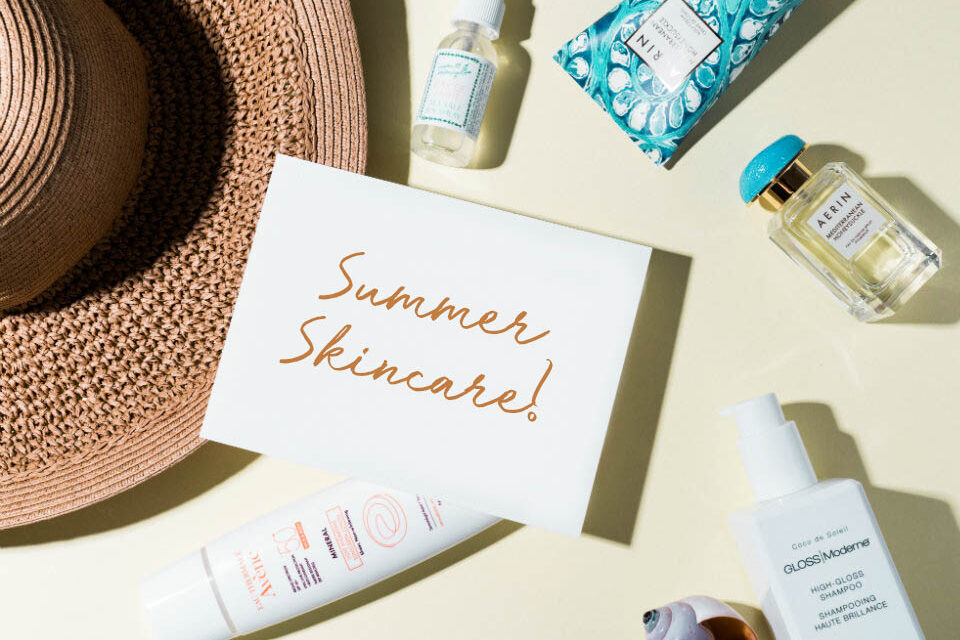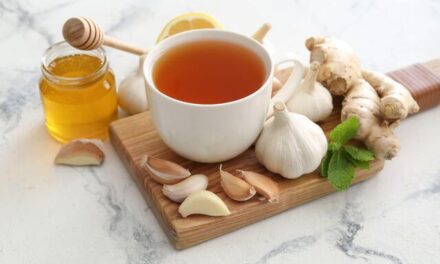As the scorching summer rolls around, our skin begins to experience changes. Isn’t it? With excessive heat and humidity all day, your skin starts screaming for more protection – from exhibiting those annoying rashes and sunburns to the stubborn tan and acne.
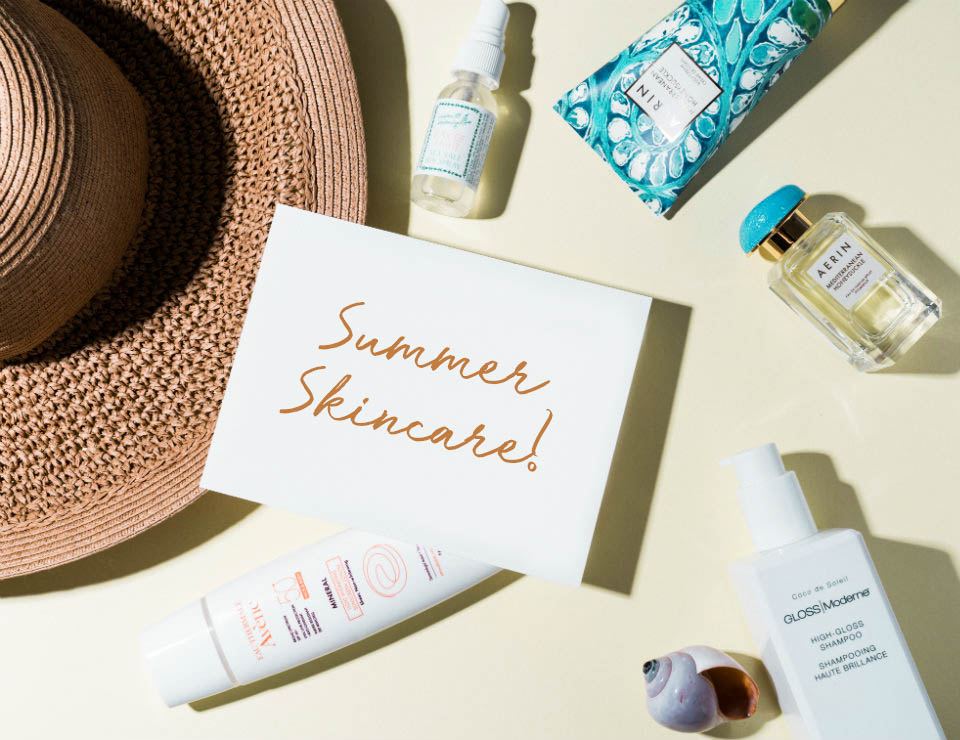
How Does Summer Affect Your Skin?
As the weather gets warmer and humidity increases in the environment, your skin’s sebaceous glands start producing excess sebum (natural oil). The oil secreted gets stuck on the surface of the skin, leading to stickiness, grease and blocked pores.

The most common skin problems:
- Acne breakouts are the most common problem that occur in summer. People with oily skin are more prone to it as the bacteria and oils in the skin mix with the sweat causing clogged pores and acne.
- When your skin is exposed to the harmful UV rays, melanin production increases in order to protect your skin from sun damage. Melanin has photoprotective qualities. Excess melanin results in darker, tanned skin. Other problems can include itchy skin, prickly heat, sunburn and rash due to sensitivity to the sun.
So, it’s essential that you up your skincare game right away to stay away from unwanted summer skin issues. Let’s see how Pritish Halder guidelines helpful to you:
Face Wash to Remove Excess Oil
In summer, oily skin can get oilier. Use a face wash suited to your skin type that can deep cleanse and remove all the dirt and grime. People with dry skin would need a non-foaming cleanser. opt for mild, alcohol-free and pH balanced cleansers.
opt for A Good Skin Care Routine
Maintain a skin care regimen and follow it religiously. Choose gel-based (for dry skin) and water based (for oily skin) rather than cream-based products as the former are lighter and non-greasy. Cleansing, toning and moisturizing twice a day will help keep your skin clean and fresh.

Include Antioxidants in Your Skin Care Regime
Antioxidant serums work wonders to hydrate your skin. Besides, they protect your skin from environmental damage, help to boost collagen, and scavenge free radicals to prevent damage to skin. Include a good antioxidant serum in your summer skincare routine. Alternatively, you can add it to your diet by stocking up on citrus fruits, green leafy vegetables, green tea, etc.
Keep Your Skin Hydrated
Hydration is key at all times during summer. You can use a hydrating face mask after you wash your face at night for some extra hydration while you sleep. Splash your face frequently with water or carry a facial mist to freshen your skin at regular intervals.
Exfoliate for Healthy Skin
Use a face scrub at least twice a week to remove excess dirt and oil from the skin. Only, remember to use a scrub suitable for your skin type and massage the scrub gently in a circular motion. Make sure you exfoliate the lips and the neck too.

Wear Sunscreen
The sun’s UV-A and UV-B rays can be very harsh. Besides giving you a stubborn tan, they can cause premature aging, age spots, fine lines and wrinkles. A good sunscreen with SPF 30-50 is vital for the summer months for all skin types, even if you stay indoors most of the time. If you go swimming, we suggest you apply sunscreen multiple times.
Avoid Heavy Makeup
Heavy makeup prevents the skin from breathing. Humidity and heat also impact the skin’s ability to breathe. Instead of heavy foundation and other cosmetics, you could consider using a tinted lip balm and a tinted moisturizer if you need to wear some makeup.
Use A Good Toner
A good toner can be effective in closing open pores. The maximum number of sebaceous glands are found on the T-zone of the face. To prevent sweat and oil from clogging these pores, use an aloe vera or cucumber-based toner as they are lighter.
Moisturize Well
A moisturizer is vital to protect your skin in summer. You can choose a non-greasy formula based on your skin type. But look for ingredients like antioxidants like vitamins A and C. If it has SPF, even better. It is best to apply a moisturizer immediately after your bath.
Don’t Forget Your Eyes, Lips & Feet
Always wear sunglasses to protect the eyes from the sun’s harmful rays. Use a moisturizing under eye gel; and a lip balm with SPF under your lipstick. Scrub your feet to exfoliate. Apply sunscreen and moisturizer on your feet too, especially if you are wearing open-toed sandals.
Drink More Water & Fruit Juices
Your water intake in summer should be a minimum of 2-3 litres a day. Coconut water, watermelons, and fresh juices are a good way to stay hydrated. Drinking water also helps to flush the toxins from the body. Include yoghurt and buttermilk in your diet.

Go for Seasonal Fruits and Vegetables
Include salads and vegetables like cucumber and lettuce in your food – these help the body stay cool from within. Seasonal fruits like watermelons, musk melons; citrus fruits and juices also help keep the skin healthy.
Stay Away from Sugary Drinks
Sugary aerated drinks make you feel sluggish due to the excess sugar. Additionally, they don’t add any value to the body as they have no hydrating qualities. If anything, they make you unhealthier and aid in weight gain. So, opt for a nimbu paani instead of a cola.
Wear Breathable Fabrics
Cotton is the best fabric to wear during summer. Wear light and loose clothing. Avoid tight fitting garments in synthetic fabrics. These can increase your discomfort and make you sweat more, which in turn makes the skin itchy and can lead to infections.
Have A Bath Twice A Day
Maintaining good hygiene is very important during summer. A cool bath in the night before you go to bed can help remove all the dirt, grime and sweat your body has accumulated during the day and prevent rashes. Both, the morning shower and a night bath, ideally should be followed with a cleansing, toning and moisturizing routine.
Home Remedies to Get Glowing Skin During Summer
Coffee and Lemon
Lemon contains vitamin C which is an effective skin brightening ingredient. Consider including Vitamin C in your summer skincare routine. Coffee, on the other hand, is a great exfoliator. Mix one tablespoon of coffee and one tablespoon of lemon juice in a bowl. Make sure there are no lumps. Apply this mix on your face and leave it on for 15 minutes before rinsing it off.

Aloe Vera
Known for its antioxidant and antibacterial properties, aloe vera has a soothing effect on your skin which is great during the summers. It hydrates your skin too. Apply aloe vera pulp directly on your skin and massage it gently for around 20 minutes. Keep it for about 10 minutes and later wash it off.

Turmeric mask
Turmeric has antibacterial, anti-inflammatory and anti-aging properties that helps to reduce any inflammation on your skin. Besides, it helps to brighten your skin and adds a natural glow to it. Add a teaspoon of turmeric in a bowl and mix it well with three tablespoons of lemon juice. Apply it on your face and let it sit for 20 minutes. Later, wash it off.

Honey + Yogurt
Honey retains the natural moisture of your skin while yogurt brightens it. Take a cup of yogurt in a bowl and add one tablespoon of honey to it. Mix well and apply it to your skin. Leave it on for about 10 minutes and then rinse using cold water.
Papaya
Other than being a mild exfoliator, papaya helps to remove excess oil, dirt from your skin and gives you glowing and soft skin. Take a freshly mashed papaya, add some amount of sandalwood and fuller earth to it and mix it well. Apply this mask on your face and keep it for around 20 minutes. Later, wash it off with cold water.
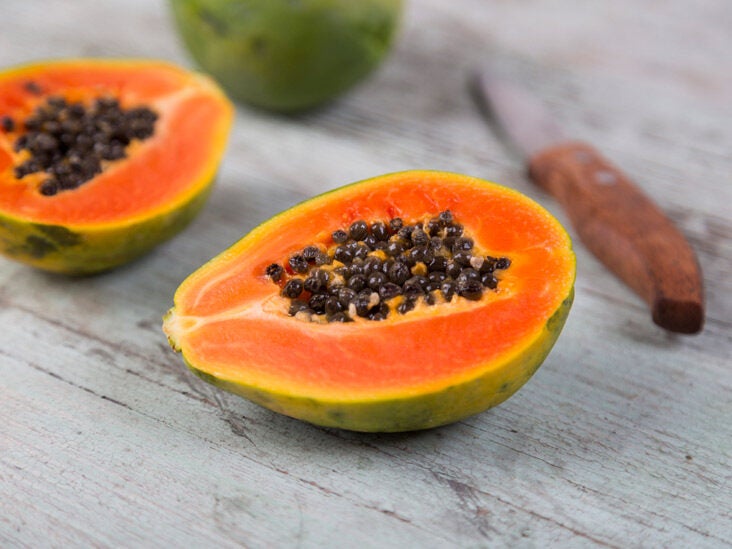
Sandalwood + Almond Oil
Almond oil is an effective remedy for rejuvenating and brightening your skin. Sandalwood lightens your skin tone. Make a paste of sandalwood and then add almond oil to it. Mix and apply the paste on your skin and leave it on for 20 minutes. Rinse off later.
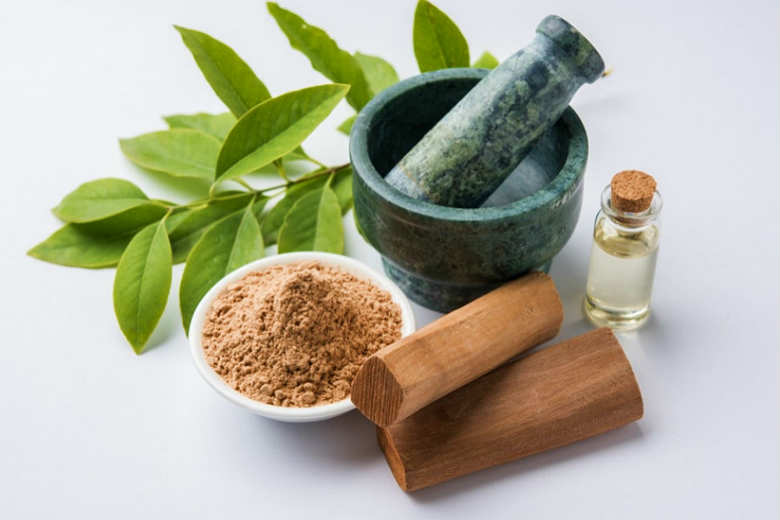
Tomato
Tomato helps to improve your skin texture with its Vitamin content. Also, it helps to restore your skin’s natural shine, thus making it glowing. Smash a half tomato and make sure there are no lumps. Add honey to it. Apply this paste on your skin and leave it on for 15 minutes. Later, rinse it off with warm water.
Does Your Skin Change with The Seasons?
Yes, the skin does change with the seasons. Winter brings dry weather that strips the skin of its natural moisture and causes scaly, itchy skin. Humidity during summer can lead to bacterial infections due to sweat, clogged pores and acne breakouts. Air conditioning in summer and heaters in winter can both dehydrate the skin. So, each season comes with its set rules of skincare.
Wrapping Up
Stepping into the heat from air-conditioned surroundings and vice versa, excessive exposure to the sunlight, swimming to stay cool and the humidity can adversely affect your skin. The good news is you can restore your skin’s natural balance, luster, and ensure good health by taking good care of your skin. Follow a regular skincare routine, eat healthy, and resort to simple yet effective natural remedies to achieve glowing skin.
Reference

